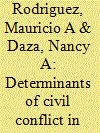| Srl | Item |
| 1 |
ID:
110182


|
|
|
|
|
| Publication |
2012.
|
| Summary/Abstract |
We analyze how the determinants of the civil conflict in Colombia at the municipal level respond to changes in the empirical strategy. We estimate several econometric models that vary in three dimensions: 1) the data set, 2) the measure of conflict, and 3) the estimation method. We find substantial differences in the signs and statistical significance of the marginal effects in response to using a different data set, changing the definition of conflict, and employing different empirical methodologies.
|
|
|
|
|
|
|
|
|
|
|
|
|
|
|
|
| 2 |
ID:
168233


|
|
|
|
|
| Summary/Abstract |
Meal frequency is an important indicator of food security and nutritional status. Defining food insecurity as a household’s inability to consume at least three meals a day, this study uses a logit model to investigate the socioeconomic determinants of food insecurity among Zambian households. Primary data from the 2010 Living Conditions Monitoring Survey data set developed by the Central Statistical Office were used. The 2010 Living Conditions Monitoring Survey used a nationally representative sample of about 20,000 households. This study found that urban households, households with higher income, and households with younger, more educated and male heads were more likely to be food-secure. Therefore, there is need to accelerate investments in formal education, narrow the rural–urban socioeconomic divide, and reduce gender inequities through deliberate policies to increase women’s access to and control over economic resources such as land.
|
|
|
|
|
|
|
|
|
|
|
|
|
|
|
|